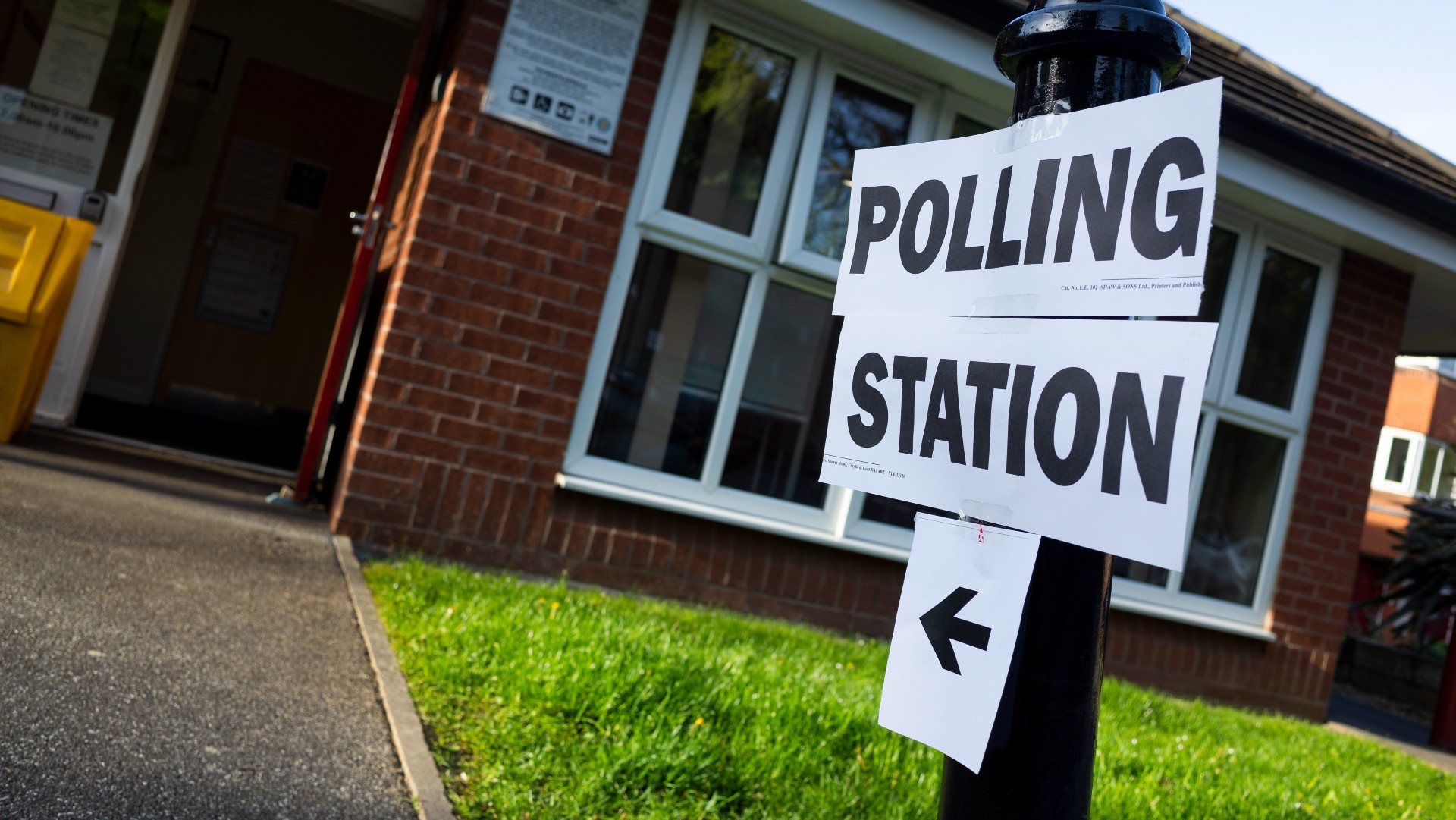Local elections 2023: the seats in contention and who might win
Polling experts say the Conservatives are in for a bruising night but that losses of fewer than 500 seats will leave them hopeful

A free daily email with the biggest news stories of the day – and the best features from TheWeek.com
You are now subscribed
Your newsletter sign-up was successful
Just one day before polls open in England for the 2023 local elections, Labour is continuing to enjoy healthy double-digit leads, pointing to a potentially bruising result for Rishi Sunak in his first big test since becoming prime minister and Conservative leader in October.
Keir Starmer’s party’s lead may have “fallen since the vast margins it enjoyed during Liz Truss’s premiership”, but the Conservatives are still predicted to struggle in key bellwether seats, and face being “abandoned” by the so-called “Red Wall” in the Midlands and north of England, The Times said.
According to the BBC’s election guru Professor Sir John Curtice “this year’s local elections… have long been billed as a tough first electoral test for Prime Minister Rishi Sunak.” But while the Labour Party’s lead has slipped in recent weeks, Curtice said, “its current poll rating, at 44%, is still as much as 12 points up on four years ago”, giving it a commanding lead going into tomorrow’s poll.
The Week
Escape your echo chamber. Get the facts behind the news, plus analysis from multiple perspectives.

Sign up for The Week's Free Newsletters
From our morning news briefing to a weekly Good News Newsletter, get the best of The Week delivered directly to your inbox.
From our morning news briefing to a weekly Good News Newsletter, get the best of The Week delivered directly to your inbox.
This election will obviously be “important for the incumbent councillors”, The Times said, as well as “those vying to replace them”. But the greater significance will be what the election “says about public opinion”. Especially because “this could be the last big test of how the public feels about the main parties before the general election that is almost certain to take place next year”.
Where are elections taking place?
The majority of councils in England last ran local elections in 2019, meaning that most councils are holding votes this year on Thursday 4 May.
The exception is councils in Greater London, which ran theirs in 2022, while Northern Ireland elections take place two weeks later on 18 May. There are no elections in Scotland and Wales.
It means a total of 8,057 seats are up for grabs in 4,831 wards across the country.
A free daily email with the biggest news stories of the day – and the best features from TheWeek.com
Mayoral elections will also take place in Bedford, Leicester, Mansfield and Middlesbrough.
Who is tipped to win?
According to Sky News analysis, the Conservatives will be defending the highest number of seats. They currently control 85 councils and will be defending 3,365 seats or 42% of the total seats contested on 4 May. By contrast Labour controls 50 councils and is defending 2,131 seats while the Lib Dems have control of 16 authorities and are defending 1,223 seats.
“There is a general acknowledgement that the local elections will not go well for the Tories,” said the i news site, citing one former Tory minister as saying that Sunak will “underwhelm” in this, his first electoral test, because “he is not a leader – he is a manager”.
As always it is as much about expectation management as how well each major party performs on the day.
The Telegraph reported that “privately, Tory sources fear that experts are correct in predicting losses of up to 1,000 seats”, driven by the popularity of Starmer compared to his predecessor Jeremy Corbyn, the squeezing of the “Blue Wall” by the Lib Dems and a dramatic decline in Tory party finances.
Polling expert Professor Michael Thrasher told Sky’s Sam Coates that while “Conservative losses are inevitable… if they can keep those losses down to around 500 to 700, they will feel that Labour isn’t really hurting them a great deal”.
Were the Tories to lose more than 500 seats, it would be the first time in over two decades that they would not be the biggest local party in England – a “huge symbolic blow”, said Sky News’s political editor Beth Rigby.
According to Politico’s London Playbook, the Conservative party “has stuck rigidly to Thrasher and Rallings’s original warnings that 1,000 Tory council seats could be lost”. The newsletter cites a Tory MP who told it “that means they think it’s going to be less”.
The 1,000 figure is “far too pessimistic,” one unnamed former Cabinet minister told Politico. “People forget that we did terribly in 2019. We were three weeks away from the worst election result in the Conservative Party’s history” – a reference to the 2019 European election that saw the Tories win just 9% of the vote, ending up behind the Greens.
However, upcoming boundary changes in more than a fifth of all councils up for election “make it much harder to predict how the vote will go as they can encapsulate a different demographic”, said Sky News.
Another unknown is how the introduction of compulsory voter ID for the first time will impact results.
Why are they significant?
Aside from who controls local councils, May’s elections are being seen as a crucial barometer of public sentiment, and will be the last major electoral test before the next general election, forecast to take place next year.
Despite “severe” losses predicted for the Tories tomorrow, i news reported that Sunak’s position as leader “should be safe through the summer”.
“But Tory sources said the PM’s position could be in trouble if the party’s current poll position is not seen to be improving in the lead up to the general election next year,” it added.
By contrast, Starmer “needs to win big at the local elections to keep up Labour’s momentum”, said Rigby.
There are of course limits to relying too much on local elections results as a way of predicting what happens at a general election.
With a greater focus on potholes and dustbin collections than on big national issues such as immigration or the state of the economy, “those who take part (turnout is usually low) often do so because they are more concerned about what is happening locally”, said The New Statesman. Certain councils will retain or lose seats “simply by virtue of whether they are deemed to be doing a good job, rather than strength of support for a specific party nationally”, the magazine added.
“But they are still significant,” it continued. “By assessing the proportion of lost and gained votes for each party, pollsters should be able to make fairly accurate predictions of the country’s mood. Think of May’s election as a practice run for the general, and a chance for each party to refocus.”
-
 Film reviews: ‘Wuthering Heights,’ ‘Good Luck, Have Fun, Don’t Die,’ and ‘Sirat’
Film reviews: ‘Wuthering Heights,’ ‘Good Luck, Have Fun, Don’t Die,’ and ‘Sirat’Feature An inconvenient love torments a would-be couple, a gonzo time traveler seeks to save humanity from AI, and a father’s desperate search goes deeply sideways
-
 Political cartoons for February 16
Political cartoons for February 16Cartoons Monday’s political cartoons include President's Day, a valentine from the Epstein files, and more
-
 Regent Hong Kong: a tranquil haven with a prime waterfront spot
Regent Hong Kong: a tranquil haven with a prime waterfront spotThe Week Recommends The trendy hotel recently underwent an extensive two-year revamp
-
 The Mandelson files: Labour Svengali’s parting gift to Starmer
The Mandelson files: Labour Svengali’s parting gift to StarmerThe Explainer Texts and emails about Mandelson’s appointment as US ambassador could fuel biggest political scandal ‘for a generation’
-
 Will Peter Mandelson and Andrew testify to US Congress?
Will Peter Mandelson and Andrew testify to US Congress?Today's Big Question Could political pressure overcome legal obstacles and force either man to give evidence over their relationship with Jeffrey Epstein?
-
 Reforming the House of Lords
Reforming the House of LordsThe Explainer Keir Starmer’s government regards reform of the House of Lords as ‘long overdue and essential’
-
 How long can Keir Starmer last as Labour leader?
How long can Keir Starmer last as Labour leader?Today's Big Question Pathway to a coup ‘still unclear’ even as potential challengers begin manoeuvring into position
-
 What is at stake for Starmer in China?
What is at stake for Starmer in China?Today’s Big Question The British PM will have to ‘play it tough’ to achieve ‘substantive’ outcomes, while China looks to draw Britain away from US influence
-
 Can Starmer continue to walk the Trump tightrope?
Can Starmer continue to walk the Trump tightrope?Today's Big Question PM condemns US tariff threat but is less confrontational than some European allies
-
 Three consequences from the Jenrick defection
Three consequences from the Jenrick defectionThe Explainer Both Kemi Badenoch and Nigel Farage may claim victory, but Jenrick’s move has ‘all-but ended the chances of any deal to unite the British right’
-
 Alaa Abd el-Fattah: should Egyptian dissident be stripped of UK citizenship?
Alaa Abd el-Fattah: should Egyptian dissident be stripped of UK citizenship?Today's Big Question Resurfaced social media posts appear to show the democracy activist calling for the killing of Zionists and police